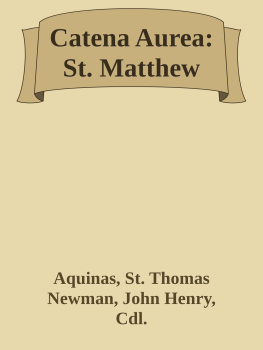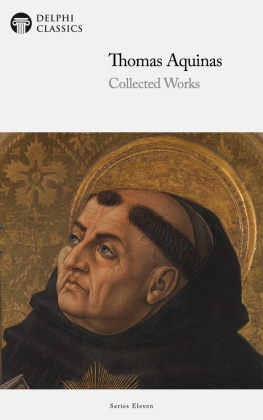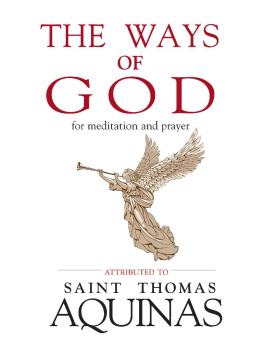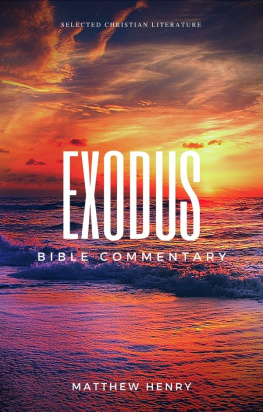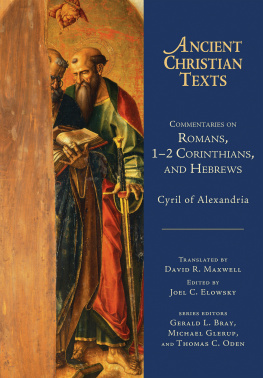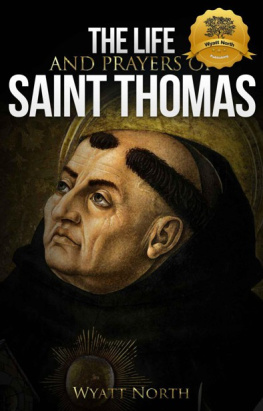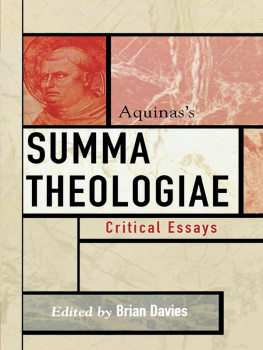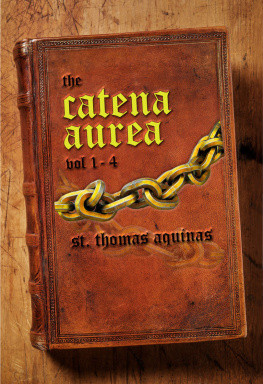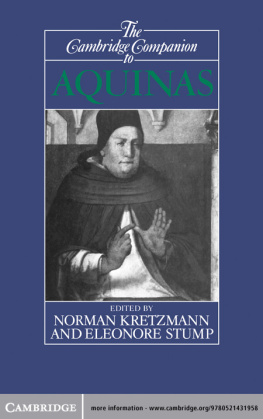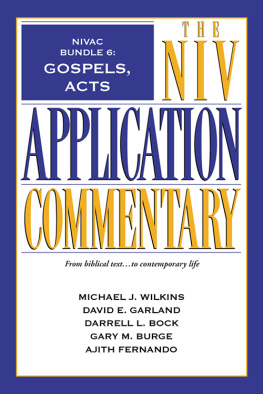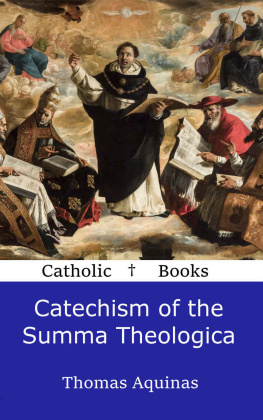Catena Aurea
Commentary
on the
Four Gospels,
collected out of the
Works Of The Fathers
by
S. Thomas Aquinas
vol. i. part 1, 2 and 3
St. Matthew
Oxford,
john henry parker;
j. g. f. and j. rivington, london.
mdcccxli
Preface
By a Catena Patrum is meant a string or series of passages selected from the writings of various Fathers, and arranged for the elucidation of some portion of Scripture, as the Psalms or the Gospels. Catenas seem to have originated in the short scholia or glosses which it was customary in MSS. of the Scriptures to introduce between the lines or on the margin, perhaps in imitation of the scholiasts on the profane authors. These, as time went on, were gradually expanded, and passages from the Homilies or Sermons of the Fathers upon the same Scriptures added to them.
The earliest commentaries on Scripture had been of this discursive nature, being addresses by word of mouth to the people, which were taken down by secretaries, and so preserved. While the traditionary teaching of the Church still preserved the vigour and vividness of its Apostolical origin, and spoke with an exactness and cogency which impressed an adequate image of it upon the mind of the Christian Expositor, he was able to allow himself free range in handling the sacred text, and to admit into the comment his own particular character of mind, and his spontaneous and individual ideas, in the full security, that, however he might follow the leadings of his own thoughts in unfolding the words of Scripture, his own deeply fixed views of Catholic truth would bring him safe home, without overstepping the limits of truth and sobriety. Accordingly, while the early Fathers manifest a most remarkable agreement in the principles and the substance of their interpretation, they have at the same time a distinctive spirit and manner, by which each may be known from the rest. About the vith or viith century this originality disappears; the oral or traditionary teaching, which allowed scope to the individual teacher, became hardened into a written tradition, and henceforward there is a uniform invariable character as well as substance of Scripture interpretation. Perhaps we should not err in putting Gregory the Great as the last of the original Commentators; for though very numerous commentaries on every book of Scripture continued to be written by the most eminent doctors in their own names, probably not one interpretation of any importance would be found in them which could not be traced to some older source. So that all later comments are in fact Catenas or selections from the earlier Fathers, whether they present themselves expressly in the form of citations from their volumes, or are lections upon the Lesson or Gospel for the day, extempore indeed in form, but as to their materials drawn from the previous studies and stores of the expositor. The latter would be better adapted for the general reader, the former for the purposes of the theologian.
Commentaries of both classes are very numerous. Fabricius a speaks of several hundred MS. Catenas in the Royal Library of France. According to Wolf and Cramer
List of Authors
Used in the Catena on St. Matthew,
With the Editions of their Works referred to in the Translation.
Origen, Presbyter of Alexandria, A.D. 230. Ed. Ben. Par. 1753.
Pseudo-Origen Homilisex ex diversis locis collect. Merlin, Par. 1512.
S. Cyprian, Bishop of Carthage, A.D. 248. Oxford Translation, 1839.
Eusebius, Archbishop of Csarea, A.D. 315. Oxford, 1838.
S. Athanasius, Archbishop of Alexandria, A.D. 326. Ed. Ben. Par. 1698.
Pseudo-Dionysius the Areopagite, A.D. 340530. Paris, 1615.
S. Hilary, Bishop of Poictiers, A.D. 354. Ed. Ben. Par. 1693.
S. Gregory of Nazianzus, Abp. of Constantinople, A.D. 370. Col. 1680.
S. Gregory, Bishop of Nyssa, A.D. 370. Paris, 1615.
S. Ambrose, Archbishop of Milan, A.D. 374. Ed. Ben. Par. 1686.
S. Jerome, Presbyter and Monk of Bethlehem, A.D. 378. Verona, 1735.
Nemesius, A.D. 380. Apud Bibl. Patr. Grc. Paris, 1624.
S. Augustine, Bishop of Hippo, A.D. 396. Ed. Ben. Par. 16791700.
S. John Chrysostom, Abp. of Constantinople, A.D. 398. Ed. Ben Par. 171838.
S. Cyril, Archbishop of Alexandria, A.D. 412. Paris, 1638.
S. Maximus, Bishop of Turin, A.D. 422. Paris, 1614.
Cassian, Presbyter and Monk of Marseilles, A.D. 424. Bibl. Patr.
S. Peter Chrysologus, Archbishop of Ravenna, A.D. 433. Col. 1618.
Council of Ephesus, Canons of, A.D. 431. ap. Labbe Concilia, Par. 1671.
Theodotus of Ancyra, A.D. 431. ap. Labbe Concilia, Par. 1671.
S. Leo I. Pope, A.D. 440. Venice, 1783.
Gennadius, Presbyter of Marseilles, A.D. 495. Hamb. 1614.
S. Gregory I. Pope, A.D. 590. Ed. Ben. Paris, 1705.
S. Isidore, Archbishop of Seville, A.D. 595. Col. 1617.
Bede, Venerable, Presbyter and Monk of Yarrow, A.D. 700. Col. 1612.
S. John, Presbyter of Damascus, A.D. 730. Paris, 1712.
Rabanus Maurus, Archbishop of Mayence, A.D. 847. Col. 1626.
Ilaymo, Bishop of Halberstadt, A.D. 853. Works not printed.
Remigius, Presbyter and Monk of Anxerre, A.D. 880. Works not printed.
Glossa Ordinaria, in ninth century. Lugd. 1589.
Paschasius Radbertus, A.D. 850. Bibl. Patr.
Lanfranc, Archbishop of Canterbury, A.D. 1080. Bibl. Patr.
S. Anselm, Archbishop of Canterbury, A.D. 1093. Col. 1612.
Glossa Interlinearis, in twelfth century. Lugd. 1589.
Preface
To the gospel According to
St. Matthew
Isaiah . 40:9
Go up to the top of the mountain, thou that preachest glad tidings in Sion; lift up thy voice with might, thou that preachest in Jerusalem:cry aloud, fear not: say to the cities of Judah, Behold your God! Lo, the Lord God shall come with power, and His arm shall have dominion; Lo, His reward is with Him.
The Prophet Isaiah, a manifest preacher of the Gospel, briefly expressing the loftiness, the name, and the substance of the Gospel doctrine, addresses the evangelic teacher in the person of the Lord, saying, Go up to the top of the mountain, &c.
But to make our beginning with the title, The Gospel.
Augustine . (contra Faust. ii. 2.) The word Evangelium, (Gospel,) is rendered in Latin bonus nuntius, or bona annuntiatio, (good news.) It may indeed be used on all occasions whenever any good is announced; but it has come to be appropriated to the announcement of the Saviour.
Gloss. Those who have related the birth, deeds, words, and sufferings of the Lord Jesus Christ, are properly styled Evangelists.
Chrysostom . (Homil. in Matt. i. 2.) For what is there that can equal these good tidings? God on earth, man in heaven; that long war ceased, reconciliation made between God and our nature, the devil overthrown, death abolished, paradise opened. These things, so far beyond our merits, are given us with all fulness; not for our own toil or labour, but because we are beloved of God.
Augustine . (de vera relig. c. 16.) Whereas God in many ways heals the souls of men, according to the times and the seasons which are ordained by His marvellous wisdom, yet has He in no way more beneficently provided for the human race, than when the Very Wisdom of God, the Only Son of one substance and coeternal with the Father, stooped to take upon Him perfect man, and the Word was made flesh and dwelt among us. Hereby He made manifest how high a place among creatures had human nature, in that He appeared to men as Very Man.
Next page
